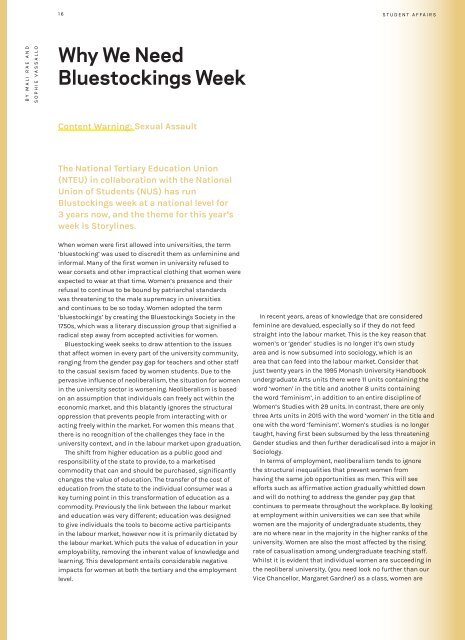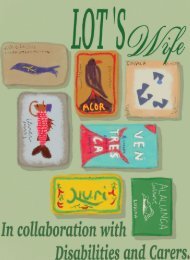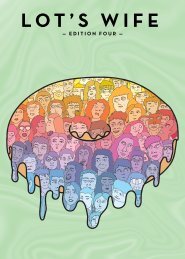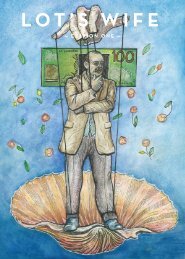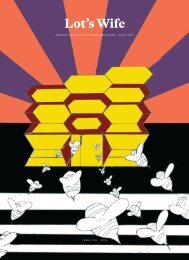You also want an ePaper? Increase the reach of your titles
YUMPU automatically turns print PDFs into web optimized ePapers that Google loves.
16<br />
STUDENT AFFAIRS<br />
BY MALI RAE AND<br />
SOPHIE VASSALLO<br />
Why We Need<br />
Bluestockings Week<br />
Content Warning: Sexual Assault<br />
The National Tertiary Education Union<br />
(NTEU) in collaboration with the National<br />
Union of Students (NUS) has run<br />
Blustockings week at a national level for<br />
3 years now, and the theme for this year’s<br />
week is Storylines.<br />
When women were first allowed into universities, the term<br />
‘bluestocking’ was used to discredit them as unfeminine and<br />
informal. Many of the first women in university refused to<br />
wear corsets and other impractical clothing that women were<br />
expected to wear at that time. Women’s presence and their<br />
refusal to continue to be bound by patriarchal standards<br />
was threatening to the male supremacy in universities<br />
and continues to be so today. Women adopted the term<br />
‘bluestockings’ by creating the Bluestockings Society in the<br />
1750s, which was a literary discussion group that signified a<br />
radical step away from accepted activities for women.<br />
Bluestocking week seeks to draw attention to the issues<br />
that affect women in every part of the university community,<br />
ranging from the gender pay gap for teachers and other staff<br />
to the casual sexism faced by women students. Due to the<br />
pervasive influence of neoliberalism, the situation for women<br />
in the university sector is worsening. Neoliberalism is based<br />
on an assumption that individuals can freely act within the<br />
economic market, and this blatantly ignores the structural<br />
oppression that prevents people from interacting with or<br />
acting freely within the market. For women this means that<br />
there is no recognition of the challenges they face in the<br />
university context, and in the labour market upon graduation.<br />
The shift from higher education as a public good and<br />
responsibility of the state to provide, to a marketised<br />
commodity that can and should be purchased, significantly<br />
changes the value of education. The transfer of the cost of<br />
education from the state to the individual consumer was a<br />
key turning point in this transformation of education as a<br />
commodity. Previously the link between the labour market<br />
and education was very different; education was designed<br />
to give individuals the tools to become active participants<br />
in the labour market, however now it is primarily dictated by<br />
the labour market. Which puts the value of education in your<br />
employability, removing the inherent value of knowledge and<br />
learning. This development entails considerable negative<br />
impacts for women at both the tertiary and the employment<br />
level.<br />
In recent years, areas of knowledge that are considered<br />
feminine are devalued, especially so if they do not feed<br />
straight into the labour market. This is the key reason that<br />
women’s or ‘gender’ studies is no longer it’s own study<br />
area and is now subsumed into sociology, which is an<br />
area that can feed into the labour market. Consider that<br />
just twenty years in the 1995 Monash University Handbook<br />
undergraduate Arts units there were 11 units containing the<br />
word ‘women’ in the title and another 8 units containing<br />
the word ‘feminism’, in addition to an entire discipline of<br />
Women’s Studies with 29 units. In contrast, there are only<br />
three Arts units in <strong>2015</strong> with the word ‘women’ in the title and<br />
one with the word ‘feminism’. Women’s studies is no longer<br />
taught, having first been subsumed by the less threatening<br />
Gender studies and then further deradicalised into a major in<br />
Sociology.<br />
In terms of employment, neoliberalism tends to ignore<br />
the structural inequalities that prevent women from<br />
having the same job opportunities as men. This will see<br />
efforts such as affirmative action gradually whittled down<br />
and will do nothing to address the gender pay gap that<br />
continues to permeate throughout the workplace. By looking<br />
at employment within universities we can see that while<br />
women are the majority of undergraduate students, they<br />
are no where near in the majority in the higher ranks of the<br />
university. Women are also the most affected by the rising<br />
rate of casualisation among undergraduate teaching staff.<br />
Whilst it is evident that individual women are succeeding in<br />
the neoliberal university, (you need look no further than our<br />
Vice Chancellor, Margaret Gardner) as a class, women are


